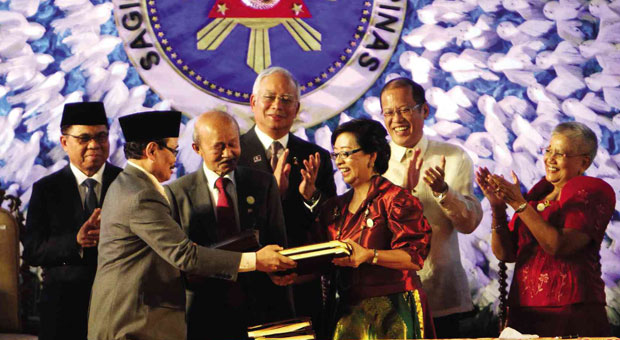
photo: LYN RILLON
Following forty years of fighting and tens of thousands dead, the Moro Islamic Liberation Front (MILF) signed a peace deal with President Benigno Aquino’s government at a high-profile ceremony in Manila on Thursday. The conflict over control of this resource-rich area stems from the claims of its Muslim population to an ancestral homeland, dating back to when Arabic traders arrived there in the 13th century. Muslims currently make up around 10 percent of the Filipino population, and most live in the south of the country. The region has long been subject to outbreaks of fighting between Muslim and Christian warlords, resulting in more than 120,000 deaths, large displacements of the population, and endemic poverty stemming from derailed development in one of the most destitute regions in the Philippines. The chaos has also attracted Islamic extremists such as the Al-Qaeda linked Abu Sayyaf group and other hardline militants.
Now with the biggest Muslim rebel group in the Philippines promising to end one of Asia’s longest and deadliest conflicts, the stage is set for the creation of an autonomous homeland for the Philippines’ Muslim minority, with locally elected leaders by mid-2016. The autonomous region will likely be named Bangsamoro, and would comprise about 10 percent of territory in the mainly Catholic Philippines southern island region of Mindanao. Bangsamoro wil have a majority of Muslims, but there are clusters of Catholic-dominated communities. Bangsamoro will not be ruled by Islamic law but will have a secular government, its own police force, and a regional parliament. Bangsamoro’s government will have the power to levy taxes, with revenues from the region’s vast deposits of natural resources split with the national government. Meanwhile, the national government will retain control over defense, foreign policy, currency and citizenship.
Despite the historic announcement, the peace deal faces further challenges. The deal needs to be approved by Congress, whose members may seek political advantage by appealing to Catholics ahead of the 2016 election and blocking or diluting the deal. Powerful Christian politicians in Mindanao may also block or dilute the law. Assuming the deal passes through Congress, the “basic law” must be ratified by a plebiscite of voters in “contiguous areas,” by “political units directly affected,” and in “geographical areas” with “common characteristics,” as defined by the peace accord. The deal is also likely to be challenged by the Supreme Court, which struck down a similar deal with the MILF in 2008 negotiated with Aquino’s predecessor, Gloria Arroyo. At that time, the Supreme Court ruled against the deal for attempting to bargain away ancestral domain in the name of Muslim “self-rule,” further describing the peace process as “whimsical, capricious, oppressive, arbitrary and despotic.” Disillusioned MILF fighters quickly returned to their arms, capturing several towns in the southern province of Lanao del Norte. Should the deal gain the approval of the Supreme Court, President Aquino’s successor in 2016 will need to maintain the political will to follow through on its commitments.
Another threat involves those Islamic militants still active and opposed to the peace, as Aquino acknowledged in his speech Thursday. “Those who want to test the resolve of the state will be met with a firm response based on righteousness and justice.” The MILF, which the military estimates has 10,000 fighters, is easily the biggest Muslim rebel group in Mindanao, yet other rebel groups maintain the potential for disruption. Among the potential spoilers is the Bangsamoro Islamic Freedom Fighters (BIFF), which broke away from the MILF in 2010 and is continuing its battle for full independence. BIFF recently joined forces with the MNLF (Moro National Liberation Front) and some components of the Abu Sayyaf in an attack, by way of reprisal and response to the Bangsamoro Agreement. In addition, a 1996 Final Peace Agreement previously forged with the MNLF will need to be brought in line with the new peace deal, lest further factions break away.
While the peace deal with the MILF leadership represents a clear breakthrough in relations, over the coming months, Aquino will need to maintain his firm resolve to crush any political opposition to the deal. Perhaps the biggest challenge — as we have seen in other newly autonomous regions — is of implementing the peace and creating order on the ground. A new police force will have to be rapidly trained to maintain order in a chaotic region long prone to weak law enforcement and home to Islamic extremists. A new government will have to be created and successfully represent the will of the people, who have long been impoverished and will not welcome any signs of corruption or cronyism, once vast resources are exploited and revenues start flowing. The challenges faced by Manila will be enormous, but the new peace accord could set an example for the rest of the neighboring countries in dealing with their own troubled Muslim populations.